New research by UVic psychologist looks into the “second pandemic” for Asian Canadians

Asian Canadians have experienced dramatically higher levels of racial discrimination and violence since the beginning of the COVID-19 pandemic. For many in the community, this has resulted in serious damage to their mental wellbeing and sense of belonging, according to new research by University of Victoria psychologist Dr. Nigel Mantou Lou.
Data from the Vancouver Police Department shows a 717 per cent increase in hate crimes targeting Asian Canadians from 2019 to 2020. Anti-Asian racism has also increased throughout the rest of Canada and is higher per capita than in the United States.
Lou interviewed 874 Chinese Canadians about their experiences throughout the pandemic. He says that for many, seeing racially motivated attacks in the media has caused fear that has led them to change their behaviour.
“We found that maybe 60 per cent of Chinese Canadians, they changed their daily routes to avoid attacks and run-ins,” said Lou. “For example, when people see a lot of attacks happening in Chinatown, they may avoid going to Chinatown to protect themselves and advise others not to go there because attacks happen there.”
Half of the participants in the study also reported being “called names, made fun of and insulted” during the pandemic.
“Chinese Canadians are worried about their children being bullied,” wrote Lou in a statement. “Many worried about their job and career opportunities being worse due to their Chinese identity.”
Lou says for many, stress about discrimination and racism pairs with general pandemic-related stressors to create a “second pandemic” for Asian Canadians.
“Racism is like a virus,” said Lou. “It can spread and can have impact on people’s health, but particularly their mental health.”
Japanese-Canadian actor and activist Peter Shinkoda says anti-Asian racism has always existed in Canada. He says the increased publicity about the issue during the pandemic validates what he always knew to be true.
“I experienced it hardcore growing up, it’s just that nobody else talked about it,” he said of his childhood in Montreal. “To a point where everybody would absolutely contest what I was seeing, like I was seeing things, you know? Like I was out of my mind.”
He recalls being called the name of Asian characters in movies and being threatened on the street while walking with his white girl friends. He says his brother, who lives in Toronto, has been the victim of two separate attacks on public transit because of his ethnicity.
Shinkoda says that while his experiences of racism have negatively affected his mental health, they also pushed him towards a career as an actor. He wanted to help break the stereotype of Asians as “weak” or “docile.”
“I knew it was a good way to somehow fight it head on, in public, in the media, by playing strong characters as opposed to what I’d seen growing up,” said Shinkoda. “Acting is activism to me.”
Speaking out against racism has not been easy for Shinkoda, who says it has lost him childhood friends and jeopardized his career. As instances of violence have worsened through the pandemic, he worries about his elderly parents.
“Right now is probably the worst in my life I’ve seen out on the streets, in people’s hearts, minds, at the cooler, at the workspace,” said Shinkoda. “I’ve never seen this kind of aggression, animosity between individuals everywhere over everything.”
He believes that learning about different cultures through forming relationships can be valuable at preventing racism.
“Go eat lunch with your Chinese friend,” he said. “You’ve got to realize that people are all the same.”
According to Lou, an effective way to combat racism is to increase the reporting of racist incidents. Only about 10 per cent of racially motivated attacks are reported. He says that when Asian-Canadians feel like a “perpetual foreigner,” it can be a barrier to reporting.
Proper data on these incidents is important to be able to raise awareness and motivate governments to create effective policy that addresses racism, says Lou. He encourages witnesses to “step up” and report when the victims of an attack might feel too uncomfortable.
Shinkoda looks to the next generation to be more accepting and inclusive.
“I think it’s a hopeful time,” he said. “At the same time, it’s depressing to see every day somewhere in the world we’re getting maimed or murdered by a stranger.”






